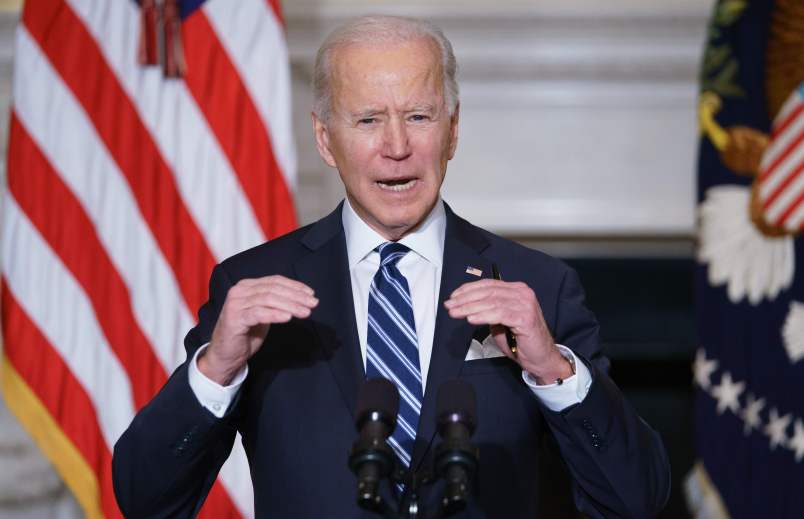President Joe Biden cast the fight to constrain climate change as both a moral and financial imperative on Thursday as he kicked off a two-day virtual summit with world leaders to address its dire consequences and attempt to reclaim the U.S.’s mantle of leadership on the global response.
“This is a moral imperative, an economic imperative. A moment of peril but also a moment of extraordinary possibilities,” Biden said as the virtual summit convened on Thursday morning. “Time is short but I believe we can do this and I believe that we will do this.”
Participants in the summit include Chinese President Xi Jinping, Russian President Vladimir Putin, British Prime Minister Boris Johnson and German Chancellor Angela Merkel, among many others.
“No nation can solve this crisis on our own,” Biden said. “All of us, particularly those of us who represent the world’s largest economies, we have to step up.”
Leading up to the event, the Biden administration had announced a pledge to cut emissions by 50 to 52 percent by the end of the decade when compared to 2005 levels.
Special Presidential Envoy for Climate John Kerry wrote on Twitter Thursday that the U.S.’s new nationally-determined contribution under the Paris Agreement, combined with efforts to slash carbon emissions by Japan, Canada, the EU and UK, would put those economies on track to limit the planet’s warming to 1.5 degrees Celsius.
With the new 2030 NDC targets from the U.S., Japan, and Canada, combined with strong EU and UK action, major economies accounting for more than half of the world’s economy have now committed to the pace of emission reductions required globally to limit warming to 1.5° Celsius.
— Special Presidential Envoy John Kerry (@ClimateEnvoy) April 22, 2021
Left unmentioned in his statement were major developing economies, including China — which, under Xi, has sent mixed messages on climate — and India. The latest round of emission-slashing targets came on the heels of a new pledge of cooperation between the U.S. and China.
The new target represents a sharp turn away from efforts by Biden’s predecessor, former President Donald Trump to deny the threats posed by climate change. Trump withdrew the U.S. from the 2015 Paris Climate Agreement; Biden promptly rejoined.
Senate Majority Leader Chuck Schumer (D-NY) said Thursday that the Senate will soon review a measure to reinstate Obama-era rules designed to reduce methane emissions from the nation’s oil and gas industry.
Key aspects of the administration’s climate agenda lie within its $2 trillion infrastructure package, including investment in green energy jobs and building charging stations for electric cars, while ending federal tax breaks for fossil fuel companies.
Biden spoke to the ambitious package during his remarks on Thursday, highlighting investments in infrastructure and innovation as part of a climate response that could serve as an “extraordinary engine of job creation and economic opportunity.”
“That’s why I’ve proposed a huge investment in American infrastructure and American innovation,” Biden said.
The White House has clarified however that its commitment to reducing carbon emissions is not dependent on the president’s infrastructure package which faces an uphill battle in the Senate.
“A lot of the plan is executable through just executive order,” Kerry said during a press briefing later on Thursday, noting that actions by the private sector would also play a significant role.
Republicans have already opposed the president’s proposal to pay for the plan in large part by increasing the corporate tax rate to 28 percent.
White House press secretary Jen Psaki, reinforced the point that much was in fact achievable through “executive action.” She added that aside from the infrastructure proposal there are “multiple cost-effective pathways” for sectors contributing to greenhouse gases to make adjustments and changes.
She cited as examples, efforts to boost energy efficiency upgrades, as well as reducing tailpipe admissions, among others.
Thursday’s announcement follows years of dire warnings from climate scientists and the United Nations.
“We are on the verge of the abyss,” U.N. Secretary General António Guterres said Monday, noting the release of a new World Meteorological Organization report detailing intensifying extreme weather events and that 2020 was one of the hottest years ever recorded.
“We are way off track,” Guterres said. “This must be the year for action — the make-it-or-break-it year.”



